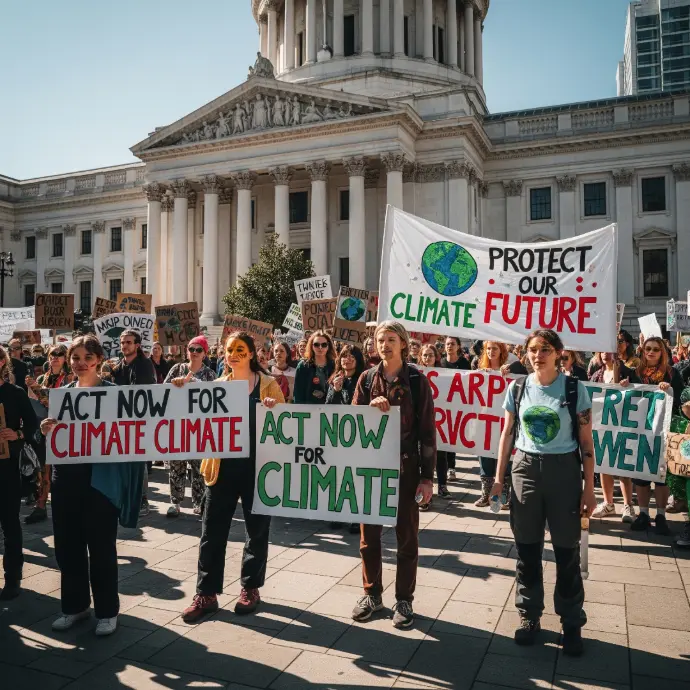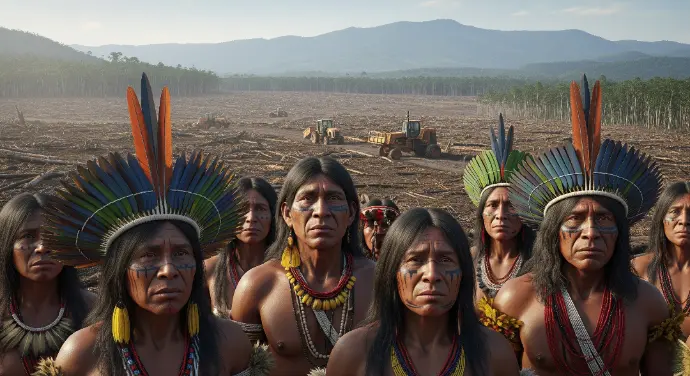In this space, we take an in-depth look at human rights at a global level, focusing in particular on rights related to the environment. Have you noticed that there are an increasing number of human rights cases linked to climate change? In our main article, entitled "Climate Change in the Courts: Landmark Human Rights Cases," we invite you to see how this situation directly affects people's lives. Prepare to immerse yourself in a world full of challenges, transformations, and the fight for justice!
Introduction
The term climate change refers to global changes in the climate, usually due to the increase in greenhouse gases in the atmosphere. This phenomenon significantly impacts human rights, as it influences the availability of food, access to drinking water, health, and housing, among other essential aspects of life.
Rising sea levels, the intensification of extreme weather events, and ocean acidification are just some of the ways climate change affects people's lives, especially in the most vulnerable communities.
The relationship between climate change and human rights has led to a growth in legal cases seeking to protect the environment and defend people's basic rights in various parts of the world.
Courts play an essential role in defending human rights in the context of climate change. Through their rulings, they can set precedents that force governments and companies to assume significant responsibilities in reducing emissions, protecting fragile ecosystems, and defending the rights of affected communities.
Likewise, courts have the power to hold those responsible for environmental degradation and the negative effects of climate change accountable. In this sense, judicial decisions can be key to promoting more sustainable practices and ensuring the protection of human rights in relation to climate change.
The role of courts in protecting human rights in relation to climate change is vital to ensuring that decisions made by politicians and businesses respect and protect the fundamental rights of affected individuals and communities.
The connection between human rights, climate change, and representative cases can be seen in the many instances where communities, NGOs, and human rights defenders have brought to trial cases related to environmental protection and the defense of the rights of those impacted by climate change.
An example would be the situation of an indigenous community in the Amazon, which opposes excessive logging caused by logging companies, or the legal actions against fossil fuel companies due to their role in the climate crisis. These cases are illustrative of the need to protect human rights in the context of climate change.
These representative cases not only demonstrate the urgency of addressing climate change from a human rights perspective, but also underscore the relevance of courts in protecting fundamental rights in the midst of a global climate crisis.

Representative Cases of Climate Change and Human Rights
Climate change poses a serious threat to the most vulnerable communities around the world, intensifying poverty, food insecurity, and lack of clean water. This unequal impact on the most disadvantaged groups highlights the connection between climate change and human rights, which has led to a growing number of high-profile court cases.
Indigenous communities, coastal dwellers, and those who depend on agriculture for their livelihoods are among those who suffer the most from climate change. Land loss, environmental degradation, and the threat to food security are just some of the hardships these communities face, demonstrating the urgent need to address the unequal impact of climate change from a human rights perspective.
It is essential that the fragility of these communities be recognized and concrete measures be implemented to safeguard their human rights in the context of climate change, which has generated multiple legal actions globally.
Given the inadequacy of action by governments and corporations to address climate change, legal actions have been filed to demand the protection of human rights. These actions seek to hold relevant actors accountable and ensure that effective measures are taken to mitigate climate change and protect vulnerable communities.
Representative climate change and human rights cases address issues such as environmental pollution, ecological degradation, loss of livelihoods, and lack of access to natural resources. These legal actions not only seek to repair the damage caused but also to prevent future human rights violations related to climate change.
The filing of these cases in both national and international courts has helped establish important precedents for the protection of human rights in the face of climate change, underscoring the importance of environmental justice in the fight against this global crisis.
In recent years, several significant judicial precedents have been documented in human rights cases linked to climate change. These cases have laid the groundwork for more robust human rights protection in relation to climate change, establishing clear responsibilities for governments and businesses to defend the environment and affected communities.
For example, in the case of Urgenda Foundation v. Kingdom of the Netherlands, the highest court in the Netherlands ruled that the Dutch government must act more decisively to reduce climate-damaging greenhouse gas emissions, based on its duty to protect the rights of its citizens.
These judicial rulings set precedents for future lawsuits and demonstrate the importance of justice in defending human rights in the face of climate change, underscoring the urgency of taking effective action to address this crisis from a human rights perspective.
Recently, the number of court cases addressing the relationship between climate change and human rights has increased. These important cases have created significant precedents and helped develop jurisprudence in this area. For example, in the case of Urgenda Foundation v. Kingdom of the Netherlands, the High Court of the Netherlands ruled in favor of the Urgenda Foundation, recognizing that the Dutch government has a responsibility to implement stronger measures to reduce greenhouse gas emissions and protect the right to life and privacy of its citizens.
These advances in laws and rulings have demonstrated the crucial role of considering climate change as a human rights issue, which has prompted a deeper analysis of government policies and actions related to the environment. It has also highlighted the need for courts and legal systems globally to adapt to better address the challenges posed by climate change, ensuring the protection of human rights in this context.
The increase in litigation over climate change and human rights has sparked a debate about the responsibility of governments and businesses to reduce environmental impacts and protect people's fundamental rights. This debate has fostered greater recognition of the importance of environmental justice and helped expand legal and regulatory frameworks for addressing the climate crisis from a human rights perspective.
Challenges and Barriers to Climate Change Judicialization
The process of climate change judicialization faces significant difficulties due to legal and legal restrictions that limit the defense of human rights. Often, both national and international legal systems are not fully prepared to adequately address the complex relationships between climate change and human rights. The absence of specific legal frameworks and the difficulty of establishing direct cause-and-effect connections between greenhouse gas emissions and specific human rights harms are significant obstacles to the pursuit of justice in this field.
Furthermore, the varied interpretation and application of environmental and human rights laws at the national and international levels adds another layer of difficulty to these cases. The lack of clarity regarding legal responsibilities and the absence of uniform standards complicate ensuring effective protection of human rights in the context of climate change. Thus, the need to create and strengthen legal frameworks that comprehensively address the protection of human rights in the context of climate change becomes evident, establishing clear mechanisms to hold relevant actors accountable and ensure adequate compensation for damages caused.
The judicialization of representative climate change cases collides with a delicate web of interests in which industries, governments, and affected communities play crucial roles. On the one hand, industries with activities that generate greenhouse gas emissions often seek to protect their economic and financial interests, which can result in considerable resistance to efforts to hold them accountable for their contributions to climate change and the resulting effects on human rights.
On the other hand, governments, which have a duty to protect the human rights of their citizens, often find themselves obliged to balance economic development with environmental protection. This tension can lead to confusing or inadequate responses to the challenges posed by climate change, thus complicating the search for effective judicial solutions.
Affected communities, especially those in areas vulnerable to the effects of climate change, often lack the resources and political power to directly confront the responsible industries and governments. This can hinder their access to justice and limit their ability to defend their rights in a legal environment that often favors those with greater resources and power.
One of the main obstacles in prosecuting high-profile climate change cases is establishing who is responsible and what compensation should be provided. The difficulty stems from the complexity of economic and political systems, as well as the global connections in creating and mitigating climate change, which complicates the task of holding individuals accountable for the harm to communities and individuals.
Furthermore, determining damage and loss related to climate change poses special challenges, as the effects often appear slowly and over time, making it difficult to directly assign blame. The need to develop efficient methods to measure and assess environmental damage and its effects on human rights represents another challenge in the search for fair and appropriate compensation for affected communities.
Thus, establishing liability and compensation in emblematic climate change cases demands innovative solutions that take into account the complexity of global systems, the interconnectedness of effects, and the need for justice for impacted communities. Addressing these difficulties is key to ensuring the effectiveness of judicialization in protecting human rights in the context of climate change.
The Role of Human Rights Defenders in the Fight Against Climate Change
Climate change has become one of the greatest threats to human rights today, making the active engagement of organizations and activists essential. As the effects of climate change worsen, there is an increase in the occurrence and severity of natural disasters, as well as the reduction of important natural resources, which disproportionately affects the most vulnerable communities. Therefore, organizations and defenders play a key role in advocating for the protection of human rights in the context of climate change.
NGOs, local groups, and human rights defenders organize to offer legal support and defend individuals and communities suffering from climate change. By filing complaints, raising public awareness, and promoting policies and laws that protect vulnerable populations, these entities are essential in the defense of human rights in the context of climate change.
The impact of activism in defending human rights in the face of climate change cannot be underestimated. Pressure from organizations and activists has led to increased scrutiny of government and corporate actions related to climate change, resulting in significant progress in the protection of human rights. Furthermore, activism has contributed to raising public awareness of the connection between climate change and human rights, fostering greater support and solidarity with affected communities.


Conclusions
Achievements, challenges, and future prospects in the defense of human rights in the context of climate change
In recent years, the defense of human rights in relation to climate change has made considerable progress. International courts and organizations have begun to better recognize the connection between climate change and human rights, leading to the creation of new legal spaces to address these issues. One of the greatest challenges in the defense of human rights in situations of climate change is establishing the accountability of the actors involved. Affected communities often live in vulnerable conditions, which complicates the clear identification of those responsible and the pursuit of compensation.
Looking ahead, the defense of human rights in climate change situations is expected to continue to advance as new legal interpretations emerge and accountability systems improve. Cooperation between governments, international organizations, and civil society will be essential to promoting a comprehensive approach that ensures adequate protection of human rights in relation to climate change.
